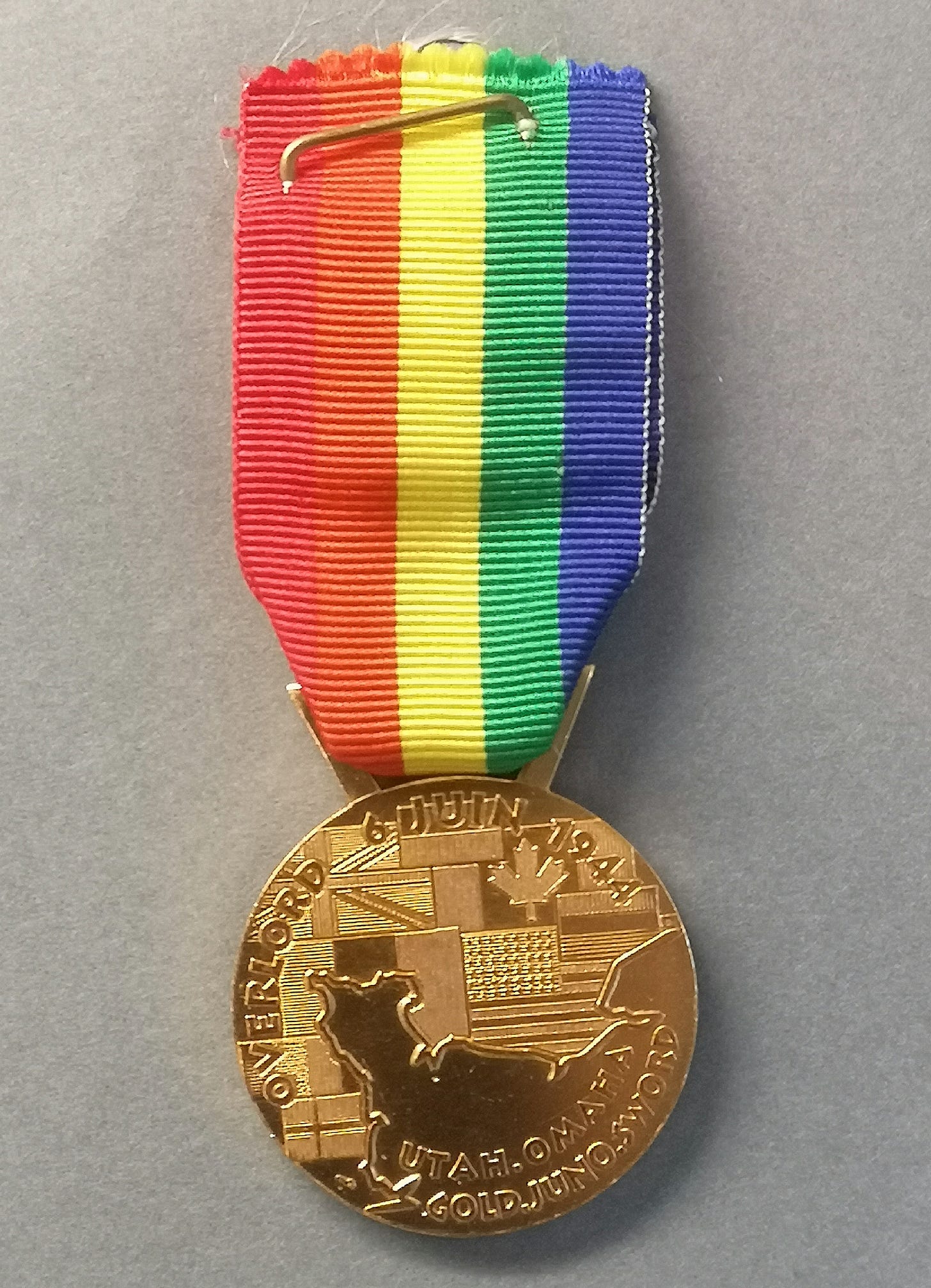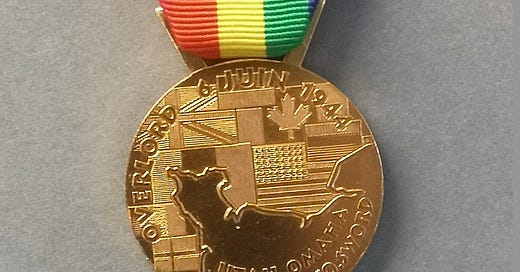McMusing: A Tribute to Veterans
Thanking Jack Gutman as I reflect on D-Day and the Impact of PTSD.
Remarkably, 30 years after this 50th anniversary medal was awarded some veterans are still living! To have them here with us to share their stories is a gift. Of special note is the story of Jack Gutman who was brave in so many ways!

The commemoration of the 80th anniversary of D-Day honored both those who died and those who lived. As I listened to and read the interviews of five veterans who returned to Normandy for the ceremony it was evident that they were impacted by trauma. At a time when PTSD was not understood, many suffered in silence. They were the silent generation.
The fact that these men have survived and had the necessary support to make the trip to Normandy doesn’t necessarily tell the full story. I heard Jack Gutman mentioned in several interviews and comments and searched for a more comprehensive interview. His memories of the carnage and his efforts as a medic were encapsulated in the following:
“It was a lot. It was more than I anticipated. It was sheer hell. You always feel: did I do enough for them?” “A lot of guys you save, but then a lot of guys die,” he said, again overcome with emotion. “And you kinda wonder, did you do enough?” Gutman said as he wiped away tears. “That brought up post-traumatic stress and so forth.” (Source)
It is crucial for us to remember that there is no “end of the war date” for those who suffer from PTSD. Many veterans die from the impact of war long after the war has ended. “In 2020, adjusting for population age and sex differences, the suicide rate for Veterans was 57.3% greater than for non-Veteran U.S. adults.” (Source) Thankfully, the suicide rate for veterans is lowering—likely due in part to our better understanding of how to treat PTSD. Death by suicide is not the only impact.
“(HUD) estimates that 40,056 veterans are homeless on any given night. Over the course of a year, approximately twice that many experience homelessness. Only 7% of the general population can claim veteran status, but nearly 13% of the homeless adult population are veterans.” (Source)
“In addition to the complex set of factors influencing all homelessness—extreme shortage of affordable housing, livable income and access to health care—a large number of displaced and at-risk veterans live with lingering effects of post-traumatic stress disorder (PTSD) and substance abuse, which are compounded by a lack of family and social support networks.” (Source)
In addition, the Veteran of war who suffers is not the only person affected. It would be impossible to estimate the number of trauma-filled stories I have read or listened to over the past ten years where the common thread in the stories was the impact of war on a family member—usually the father.
“Many children of World War II and Vietnam veterans share about their parents’ unpredictable tempers, mood swings, and alcohol abuse. All of these are common effects of unresolved trauma.” (Trauma in the Pews)
Since younger generations have not lived during a time when our country was involved in a major military conflict, it is unlikely they recognize the impact it has had on our country, communities, and families—including both parents and grandparents. Taking a history class, watching a movie/documentary, or honoring an aging family member who served, while important, says little about the impact. “The prevalence of PTSD in combat soldiers is important because the history of our nation began with war and has seldom not been warring in some form.” (Trauma in the Pews)
Jack tells the story of a Thanksgiving dinner when he passed out from drinking and said, “The drinking was a gradual thing as the flashbacks happened. I kept drinking a little more over the years.” (Source)
“Jack was haunted by his memories. While on leave after Normandy, he began to have flashbacks, although he didn’t know what they were. “We didn’t know about post-traumatic stress. Back then it was called battle fatigue. And we figured we’d get over it. But I had to have 3 1/2 years of therapy to get over it,” (Source)
It is common for the adult children of those who suffer from the impact of trauma to not recognize the connection between their parent's symptoms caused by war trauma—especially since most who served are so uncomfortable with sharing. “The flashbacks Jack Gutman experienced began when he was leaving the Pacific for the United States. They continued, no matter what he did, and he drank alcohol to try to forget. He doesn't think his family ever knew the source of his difficulties.” (Source)
Jack’s story has a better ending than many though, “he felt he had a big wound that kept bleeding through the band aid for 66 years. He was successful in several other career choices, masking his difficulties.” (Source)
Jack’s realization that success masked his PTSD stopped me in my tracks because many who suffer are not who we typically consider. They have families, have made successful career choices, and often begin to come apart as they grow older. Though my trauma story is different than war, this is exactly what happened to me. And when my generation finally admits to needing help is similar to this part of Jack’s story. “When he was at his lowest ebb, he went to an interview at a veteran's hospital, admitted losing his hearing at Okinawa, and, after some prodding, finally revealed his flashbacks.” (Source) He was strong his entire life in ways that did not bring healing.
In other interviews, Jack talks about how he came to faith and how important God has been in his life. I also do this, but healing did not arrive in the church where “the only answer ministry leaders had for [us] was salvation and the forgiveness of sin.” (Trauma in the Pews) As Christians, it is easy to grab the parts of Jack’s interviews in which he is grateful to God and completely miss how often he emphasizes the therapy that was necessary to heal from the impact of PTSD.
On Memorial Day, we honor those who bravely sacrificed their lives in service to our country. On Veteran’s Day, we honor all still living who served our country. On June 6th, we commemorated both those who died while serving on D-Day, those who have since passed, and those who are living. It is in the stories of those who still live that we can catch glimpses of the war that never ends for many veterans. Sadly, for those who did not have the help and resources they needed, the impact of their trauma may still live on in their children and their children’s children.
Today, I wanted to honor Jack Gutman and many others like him who finally reached out for help and bravely worked through the healing process. There is such fear in facing the emotions embedded in traumatic memories. It is necessary to process that fear through grief and emotional/physical release.
Possibly, my favorite quote from the interviews was this one:
“While watching the movie "Saving Private Ryan," he found it so realistic that he broke down crying, and was a "basket case" for several hours. Gutman said Steven Spielberg did a great job on the movie. His therapist said it was ok to have reactions to things like that. He no longer has the flashbacks, but is still emotional.” (Source)
That is exactly right! Healing does mean what happened to us is erased, it allows us to remember with less of the debilitating impact of PTSD. It isn’t a magic wand; it is knowing and accepting what happened without it upending our lives.
I doubt Jack Gutman will ever see what I have written here, but if he does, I hope he feels honored not only for his service but for a life well-lived and for being brave enough to reach out for help. Jack, you are one remarkable human being!
Note: McMusings are usually the result of falling down deep rabbit holes. I read and listened to several interviews and articles and have done my best to correctly link the source and apologize if I notated a source with the wrong quote (or wrong page of articles). All the sources are there though! They are well worth reading.




I love your rabbit holes! Thank you for this. So important!
This makes sense to me. My Dad and his brothers were in WW2 as was my Mother. Looking back I realise that my parents seldom showed emotion or spoke about their experiences. But understanding trauma as I do now it is clear that they were both traumatised. I doubt they realised they were as it wasn’t spoken about back then.